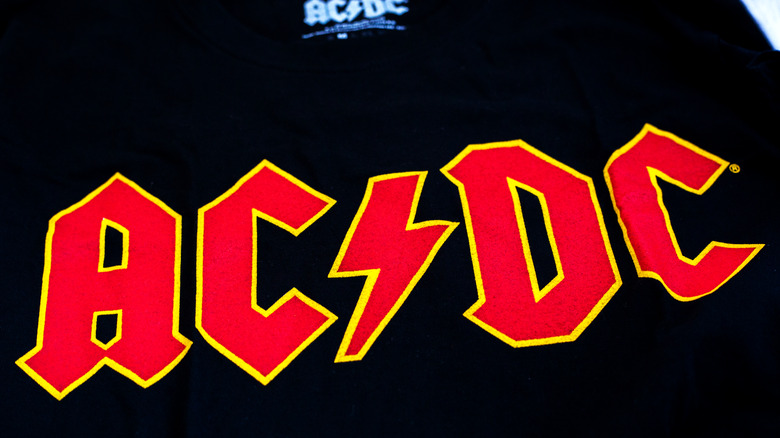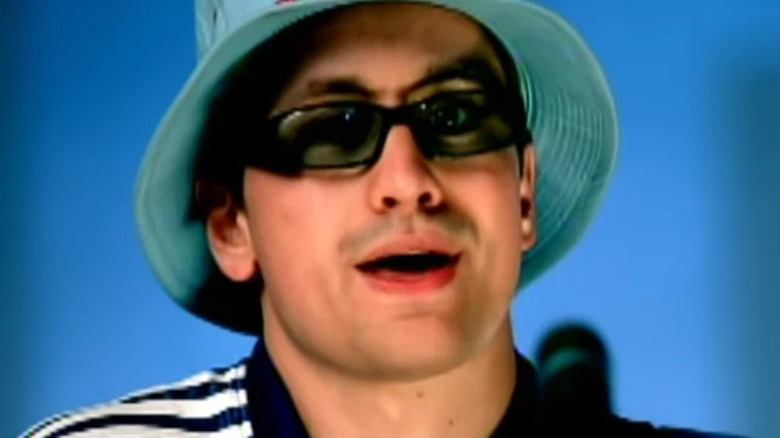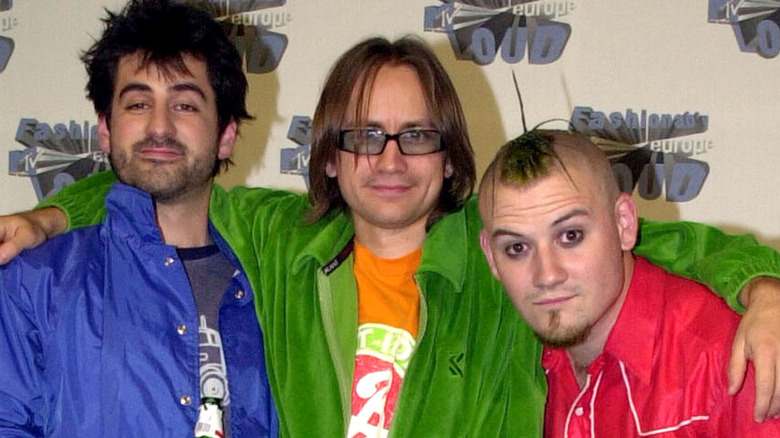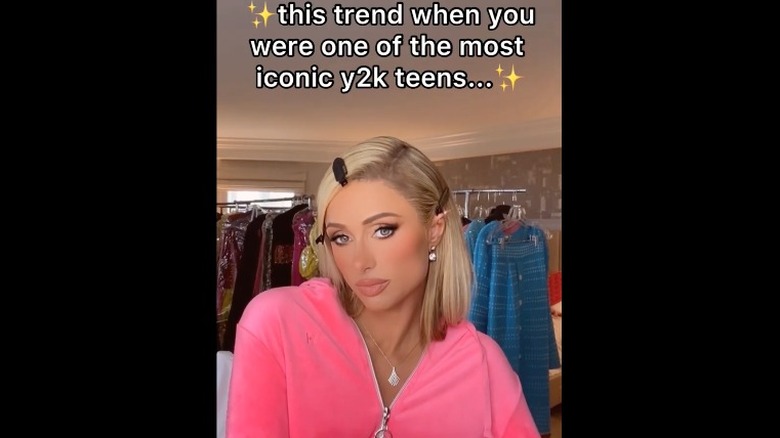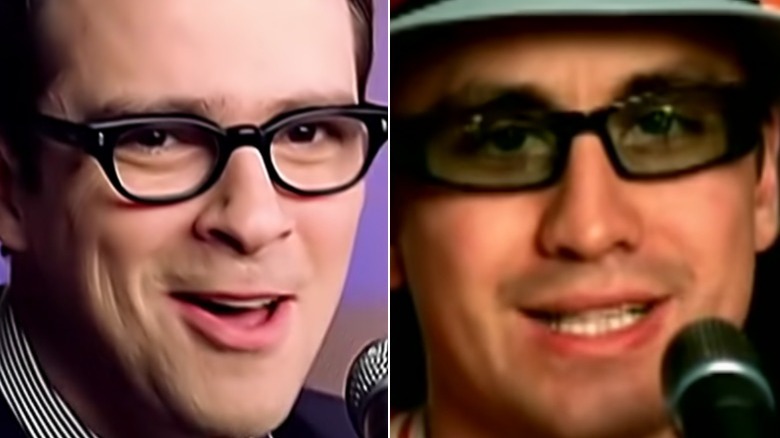The Untold Truth Of Wheatus
Right around the turn of the millennium, a band emerged on the scene fully formed, with a debut, major-label album heralded with a catchy, hook-laden, hard-rocking single with which they would be forever associated. That band was Wheatus, who came out of Long Island, New York, with their self-titled debut and the classic singalong-ready, anthemic metal nerd-meets-popular-young-woman story song "Teenage Dirtbag."
For more than two decades, as ABC reports, Wheatus has stuck around, recording plenty more albums' worthy of lyrically honest and quirky power pop. Touring extensively, and cycling through a lot of like-minded musicians, they have enjoyed a devoted fan base and a stellar reputation built around that one deniable song, their first and only major tune to take off in the United States. "Teenage Dirtbag" has appeared in movies, became an internet phenomenon, and is fondly remembered by the public as a quintessential slice of Y2K-era pop culture. So don't feel like mold, grab your tickets to Iron Maiden, don't say maybe, and read on for the story of the creation, rise, and what happened next to Wheatus.
Murder and anti-heavy metal sentiment inspired 'Teenage Dirtbag'
Wheatus's most famous song, "Teenage Dirtbag" tells the story of a lonely, nerdy metalhead with a crush on a preppier classmate who turns out to be into metal, too, as described by NPR. While Wheatus leader Brendan B. Brown wrote the song as a work of fiction, he was inspired by real people and real events. "There was a murder in my town when I was ten and it turned out to be teenagers who were doing enormous amounts of drugs," Brown told the Cambridge Independent. "These kids got involved in some kind of Satan thing and they lured their friend Gary [Lauwers] to the woods and stabbed him to death in the name of the devil." When the ringleader, Ricky Kasso, was arrested, he was clad in an AC/DC T-shirt and was an outspoken fan of heavy metal acts like Judas Priest, Black Sabbath, and Ozzy Osbourne. Coinciding with the mid-1980s "Satanic Panic" (as reported by Vox), adults in the Long Island community were concerned that the dark and heavy music could convince teenagers to kill. Brown says that kids in the area who were into metal, like him, were made to feel like pariahs.
Brown drew on those feelings of otherness when he wrote from the point of view of the narrator in "Teenage Dirtbag." He recalled seeing the word "dirtbag" for the first time in a 1984 Rolling Stone article about the Ricky Kasso murder case, used to describe the murderer and his social circle.
'Teenage Dirtbag' took four years to write
It took Wheatus founder and creative leader Brendan B. Brown a while to assemble all that material from disparate sources and then shape it into something with which he was musically pleased. "The guitar sound and beat were things that I worked on for four years," Brown told the Cambridge Independent. "I wanted there to be this feeling of early hip-hop, LL Cool J and Public Enemy from the waist down and James Taylor and Metallica, AC/DC and Paul Simon from the waist up." After a couple of abandoned attempts that went nowhere because he found them to be "terrible," sound-wise, Brown came up with a track that he thought was a wholly original pastiche. "I knew we had invented something that was unique to the song and the composition and nothing else was going to have that," he said. Still, Brown said that he had a difficult time explaining to outside producers what form the song should take.
Wheatus multi-instrumentalist Philip A. Jimenez helped Brown realize his vision. "We worked hard at getting an acoustic feel so that when the distortion kicked in, it could be punk-rock," he told The Guardian. Jimenez produced the initial version of "Teenage Dirtbag," independently recorded and released to the New York area via a service called Billboard Talent Net, which resulted in a major-label bidding war.
Wheatus was a homemade operation
According to Wheatus's biography, Brendan B. Brown of Long Island, New York, enlisted his brother, Peter, and some friends to round out his band's lineup. By the end of the 1990s, Brown had written so many songs that Wheatus recorded some demos in the Browns' mother's house. After interest from three labels (according to The Guardian), Wheatus signed with Sony subsidiary Columbia Records and received a $50,000 recording budget."There weren't a lot of real drums on those demos, so we finished the record properly at my mom's place," Brendan B. Brown told Alternative Press.
That self-produced album is the one that reached the public in 2000. However, according to Rolling Stone, Wheatus recorded the masters on ADAT, a format often used in the '90s but was on the path to obsolescence by 2000. After Wheatus's self-titled debut was released, Columbia asked Brown for the masters with an eye toward remixing the songs. "I told my A&R guy, 'This is my last set of masters — are you guys putting them on backup?'" Brown says. "We never found out where they went." And so, when it came time to remaster the album for a 20th-anniversary re-release in 2020, Wheatus had no working copy of the record from which to work, leaving them little choice but to churn out a note-for-note, perfect re-creation of the 20-year-old LP. That one was also recorded at home, this time at Brown's home studio.
'Teenage Dirtbag' was heavily edited for many reasons
When "Teenage Dirtbag" was released as Wheatus's first single in 2000, Columbia Records promoted it to radio stations and TV music video networks. Content on such media channels is subject to internal standards and practices rules, and broadcasters answer to advertisers, so censorship and editing a song or video's content was a non-negotiable. "Teenage Dirtbag" hit the airwaves in a subsequently heavily modified form (via R&M TV), different from what appeared on the commercially released CD.
At the top of the second verse, the narrator describes the boyfriend of his crush, Noelle, calling him a "d***" who "brings a gun to school," and who would kick the "a**" of the titular teenage dirtbag if he knew about his feelings for his girlfriend. "D***" and "A**" are considered minor curse words, and were frequently excised from "Teenage Dirtbag," replaced with silence: in TV performances, singer Brendan B. Brown wouldn't say the words and would roll his eyes or make another knowing gesture (via mymusicfootage/BBC). "Gun" was similarly silenced for context. When "Teenage Dirtbag" was climbing the charts in the spring of 2000, according to Rolling Stone, it coincided with the anniversary of the Columbine school shooting, and Columbia's parent company asked Brown to change it. He wouldn't, so the radio edit scrambled the word.
What's a 'Wheatus,' anyway?
The initial version of Wheatus, formed in 1995, according to AllMusic, was essentially a family act. Brendan B. Brown created the group in his New York home and took on vocals and guitar, and asked his brother, Peter Brown, to play drums. Their sister, Liz, contributed backing vocals and occasionally serves as Wheatus's tour manager. It made a lot of sense then for the Brown siblings to give their band a name that referred to all three of them somehow.
According to the Swindon Advertiser, the Browns' father's affectionate nickname for his kids was "Wedus," which they all believed meant "small folks." (Per Glosbe's Javanese dictionary, "wedus" means "goat," so indirectly, the word means "kids.") Still, Brendan B. Brown wanted to use a made-up word for his band and thus changed the spelling of Wedus. "I wanted a nonsense word so we became Wheatus," Brown said.
Wheatus was much more popular overseas and over time
Now forever linked to and virtually synonymous with "Teenage Dirtbag," Wheatus is regarded as one of history's more significant one-hit wonders. That derisive superlative isn't exactly accurate, however. In the band's native United States, Wheatus is actually a no-hit wonder. "Teenage Dirtbag" reached #124 on Billboard's chart (per Music VF.com), never making the flagship Hot 100 pop listing. No other Wheatus single has made any American chart, and only its first album sold well enough to register with Billboard, peaking at #76.
But outside of the U.S., Wheatus ran up a respectable string of multiple-hit singles. In the U.K. charts, "Teenage Dirtbag" reached #2, "A Little Respect" peaked at #3, and "Wannabe Gangstar hit #22, according to Music VF.com. "Teenage Dirtbag" even topped the pop charts in Austria (per austriancharts.at) and Australia, according to australian-charts.com.
Internationally, "Teenage Dirtbag" is a song that just doesn't go away. In the U.K., the song re-entered the charts and fueled a 2022 social media fad (per Alternative Press). "Every teenager has to go through that 'being an outsider' thing, at least a little bit," Wheatus frontman Brendan B. Brown told Tone Deaf, attempting to explain the song's enduring and growing popularity. Royalties from "Teenage Dirtbag" helped keep band members personally financially afloat, according to Observer, in 2009 when the song was used in the HBO series "Generation Kill," and in 2013, when boy band One Direction covered it in their concert documentary "This Is Us" (via Clandestines SaturdayAsUsual).
Wheatus potentially damaged their own career
After "Teenage Dirtbag" came and went on pop charts around the world, as documented by Music VF.com, Columbia Records issued Wheatus's follow-up single in 2001, the thematically similar but musically gentler "A Little Respect," a cover of a massive 1988 hit by English synth-pop duo Erasure. The Wheatus version of the song flopped hard in the U.S., missing Billboard's pop and alternative rock charts entirely, but resonating with fans in Britain (where Erasure was also more successful), peaking at #3 on the main singles chart. That, and the #2-cresting "Teenage Dirtbag," are the only top 10 hits Wheatus would ever have in the U.K., as the band killed some career momentum at a crucial time, according to AllMusic.
It has long been customary for acts with high-ranking singles to appear on the British TV series "Top of the Pops," hop up on stage, and lip sync and mime playing their instruments, as reported by The Guardian. Wheatus refused to do that for "A Little Respect," opting to do their thing live and for real (via Mike Devery/BBC). "I refused because I feel like if we do that then we're cheating our audience," singer Brendan B. Brown told Crack in the Road. "We've worked hard to be good at what we do, and I think we have a right to showcase it if we're lucky enough to be invited onto TV."
Wheatus upset their first record label
From very nearly the beginning of its time on Columbia Records, Wheatus clashed with its label bosses. According to Rolling Stone, executives tried to get band leader Brendan B. Brown to toss member Philip A. Jimenez so the band would resemble popular trios like Green Day and Blink-182, and to change a line in "Teenage Dirtbag." Brown refused both dictums, but Columbia still released Wheatus's self-titled debut and lead-off single "Teenage Dirtbag" in 2000. According to Brown, the label mishandled the potential hit. "It went to pop radio way too fast and needed more time on rock radio," Brown told Observer. "By the time Thanksgiving rolls around we're performing for two people in Lawrence, Kansas."
At that point, Brown says, record sales were so dismal that nobody at Columbia would return his calls and the label effectively left them to their own devices for a month, until "Teenage Dirtbag" blew up in Australia, and they were urged to fly to that country for promotional events. Wheatus recorded another album, "Hand Over Your Loved Ones," which Brown self-produced, against the label's wishes, according to All Around New Music. With the poor performance of the previous album and the tension with Brown certainly factoring in, Columbia barely promoted "Hand Over Your Loved Ones" upon its 2003 release.
Wheatus started its own label
Owing to a fraught relationship and after their second album met with disappointing sales figures, Columbia Records and Wheatus parted ways in 2005, according to All Around New Music. With that newfound creative and commercial power, Brendan B. Brown formed a brand new record label, specifically to release the music of Wheatus, and only Wheatus. According to Bandmix, Brown's label secured distribution deals in the U.S. and the U.K. for his label. The first full-length album to come out on their new label Montauk Mantis Records (per Discogs), was a re-release of Wheatus's ill-fated second LP, "Hand Over Your Loved Ones," retitled "Suck Fony" (via AllMusic). That title is a thinly-veiled strike at the international entertainment conglomerate and corporate parent of Wheatus's old label, Columbia Records — the "F" and the "S" have been transposed to hide a profane message towards the band's old bosses.
Wheatus had a busy 2005. Just after unveiling "Suck Fony," the band released its third studio album, "Too Soon Monsoon," on its Montauk Mantis imprint, per AllMusic.
Former teens on TikTok love 'Teenage Dirtbag'
More than 22 years after it first hit the radio, Wheatus's "Teenage Dirtbag" experienced a new surge in popularity. According to Observer, in August 2022, "Teenage Dirtbag" was the most searched-for and sought-after song on Spotify. The reason: A large swatch of the music streaming service's users wanted to hear the full, unmodified version of the song, which was currently blowing up as a trend on TikTok. Accompanied by a sped-up and pitch-shifted clip of the song's chorus, TikTokers posted nostalgic, wistful, and self-deprecating montages of pictures of themselves in their teenage years, wearing dated clothes or looks and engaging in regrettable and embarrassing behavior — a capsule of their uniquely "teenage dirtbag" time.
It became enough of a fad that celebrities got in on it, posting their own "Teenage Dirtbag" scored visual representations of their younger days, including Joe Jonas, Cheech and Chong (per 979 CPR Rocks Facebook page), Gwen Stefani (via TikTok), Demi Lovato, and Paris Hilton. The fad also prompted TikTok-based covers and reinterpretations of the song, including an artist named Jax, who reimagined "Teenage Dirtbag" from the point of view of the narrator's object of affection, Noelle.
Wheatus is really Brendan Brown
Wheatus formed in New York state back in 1995 at the behest of singer-songwriter-guitarist Brendan B. Brown. At first, it was arranged in the style of a garage band, with Brown's brother, Peter, playing the drums, and recruits Phil A. Jimenez and Rich Leigey forming the initial quartet lineup, per AllMusic. But Brown created the group, oversaw its creative vision, and emerged as the main and major singer-songwriter quite early — on Wheatus's self-titled debut, Brown alone wrote eight of the record's nine original songs.
Even while Wheatus was rising thanks to the cult popularity of "Teenage Dirtbag" in 2000, the band's composition started changing, with Rich Leigey (bassist and composer of the only non-cover on the Wheatus record not attributed to Brown) leaving and Mike McCabe coming in. Nearly 30 years after its creation, and with only one significant hit and six studio albums to its name (per Discogs), Wheatus has been the musical home of many different musicians, per last.fm. And the only continuous and constant member is Brendan B. Brown.
Wheatus isn't Weezer
A millennium-era band, fronted by a guy wearing glasses, that made hooky, power pop-based, guitar-driven alternative rock songs about awkward, lonely, self-loathing teenage boys: That could describe Weezer, and it could also describe Wheatus. There was certainly a lot of overlap between the two fanbases of those two bands who occupied nearly adjacent slots in CD bins at music stores, and their names even sound similar, as Kerrang! describes. It's easy to confuse Wheatus and Weezer, and in the former's big breakout period around 2000, illegal internet music pirating services such as KaZaA, as Gawker reports, frequently attributed Wheatus's "Teenage Dirtbag" to Weezer (via Twitter).
To plenty of casual music fans and followers then, "Teenage Dirtbag" virtually became a song by Weezer, who didn't do much to clear up the confusion. Quite the opposite, in fact, as when they learned to play the Wheatus song and added it to their set list, as reported by NME, playing it live at concerts in 2011 (via ihearttheweakerthans) and 2012 (via Weezer B-sides). Showing that there were no hard feelings, or at least that they were in on the joke, Wheatus responded by adding a Weezer song to its oeuvre. In 2020, they released a video of a studio performance of Weezer's 1994 song "My Name is Jonas" (via WheatusOfficial).

